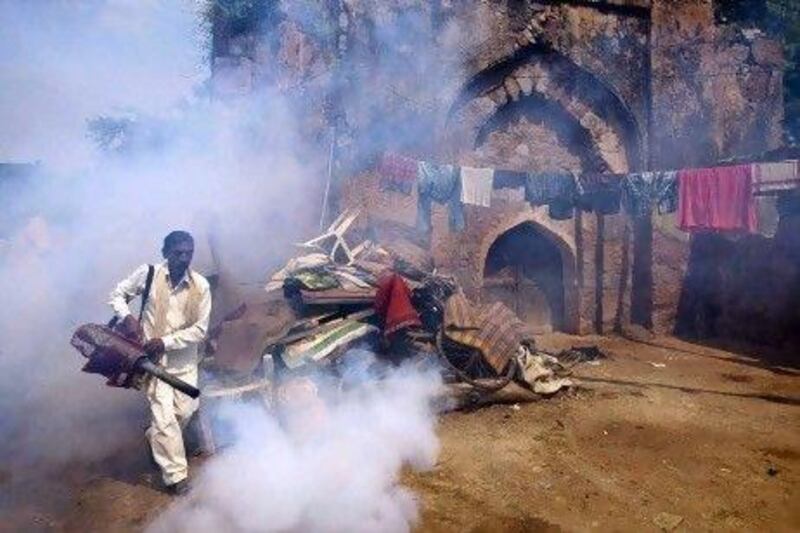NEW DELHI // India is facing a spike in dengue fever, the potentially fatal mosquito-borne disease.
There have been 12,500 cases since September, compared with 2,859 in the same period last year, and the virus has killed 77 people in southern India this year compared with 33 last year.
Health chiefs are now looking at every way to curb the spread of the disease - even urging children to wear long trousers and long-sleeved shirts for three months to limit exposure to mosquito bites.
"It is not a panic situation, but we want to ensure that we take adequate prevention measures," the health minister Ghulam Nabi Azad said.
Dengue fever is caused by a virus transmitted by the Aedes aegypti mosquito. Symptoms include fever, body ache and dehydration. There is no approved vaccine to prevent it, and no specific treatment.
Most cases are reported in October, just after the monsoon rains when the weather starts cooling, but reports of patients with dengue have been coming in from the southern states since last month.
The government has announced a number of initiatives to better equip hospitals in the states of Kerala, Tamil Nadu, Karnataka, Andhra Pradesh and the union territory of Pondicherry.
The problem has always existed in Delhi, although fewer cases have been reported this year: 400 so far this season, down from 450 from October last year.
"Most of our beds are filled with dengue patients," said Vivek Nangia, a doctor at Fortis hospital in Delhi. "Lots of patients are coming with dengue symptoms every day."
Mr Azad said government and private hospitals would be equipped with the materials needed for testing patients. He also released funds to spray pesticides in mosquito breeding areas.
The minister asked schools to allow pupils, especially boys, to amend their uniform requirements because children are "most susceptible", he said. In Chennai, for example, where it is hot and humid throughout the year, school uniforms for boys are usually shorts and short-sleeved shirts.
Authorities can fumigate areas identified as breeding grounds, but the best way to prevent the spread of dengue to humans is to avoid stagnant water, or areas where pools of water collect from after the rains. The A.aegypti mosquito, unlike the mosquito that spreads malaria, breeds in clean water and can bite several people in one feeding session. They are most active at dusk and dawn.
Saju V Itty, executive officer of the Kerala Voluntary Health Services in Kottayam, said the reasons for the spike in dengue cases could be a combination of irregular rain patterns and a lack of "social hygiene awareness among people and waste management problems".
"Local bodies are facing a lot of problems trying to control the spread," said Mr Itty. "This is a very bad situation."
Mr Itty said an abnormally long monsoon season, which starts in Kerala in June and usually ends by July, may have led to a boom in mosquito populations.
"Total rainfall is down but the season continued until September this year with untimely showers," he said.
"But the real problem is that authorities are not getting enough support from the people when it comes to waste management."
[ sbhattacharya@thenational.ae ]
Follow
The National
on
[ @TheNationalUAE ]
& Surya Bhattacharya on
[ @SuryatapaB ]





